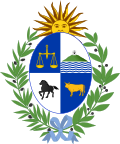| Ministerio de Relaciones Exteriores | |
 | |
 Santos Palace, headquarters of the Ministry. | |
| Ministry overview | |
|---|---|
| Formed | 22 December 1828 |
| Jurisdiction | Government of Uruguay |
| Headquarters | Montevideo |
| Minister responsible | |
| Website | Foreign Relations |
The Ministry of Foreign Relations (Spanish : Ministerio de Relaciones Exteriores, MRREE) is Uruguay's government ministry responsible for planning, directing, and implementing the country's foreign policy and international relations. It oversees Uruguayan embassies, consular representatives, permanent missions to international organizations, and other state services abroad.
Contents
Commonly referred to as Cancillería ( Spanish for 'Chancellery'), it is headquartered in the historic Santos Palace, located in Downtown Montevideo. [1] The current foreign minister is Mario Lubetkin, who has served since March 1, 2025 in the cabinet of Yamandú Orsi. [2]
